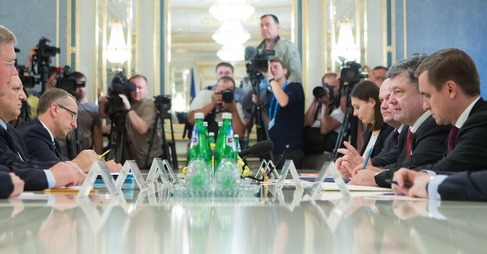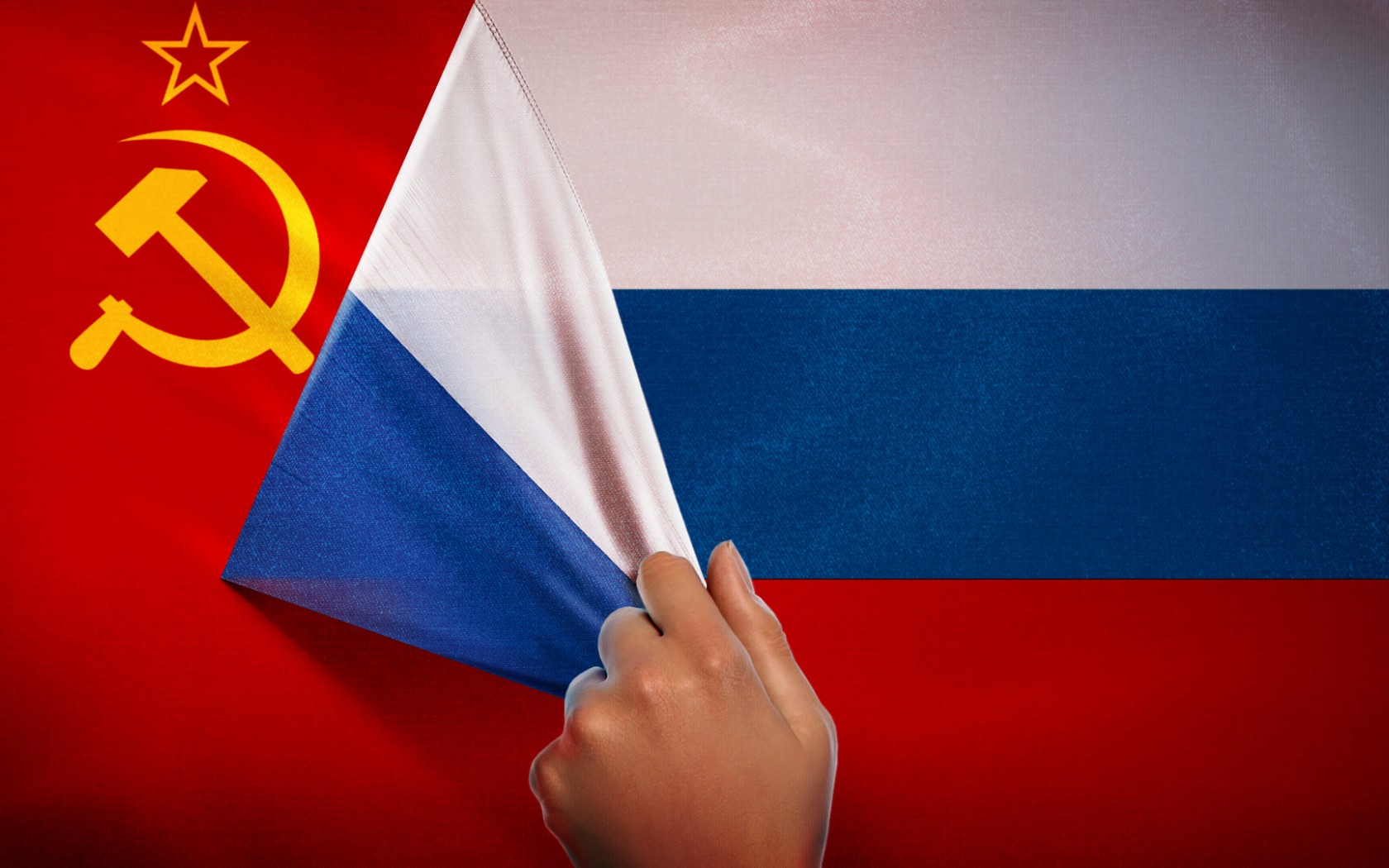“Few realize that the hybression occurs every day within the free Ukraine: in government agencies, on TV channels, at Western embassies in Kyiv. It’s carried out with the same tactics, with the same technologies as in the case of Moscow’s interference in the US, British, and French politics,” believe the authors.
Here we publish the translated key parts of the article.
The objective of Kremlin’s hybression (“hybrid aggression“) is primarily to create chaos and a controlled conflict, rather than the fomenting a pro-Moscow public opinion on particular issues. That is why people acting as instruments of the Kremlin’s aggression are often not outspoken traitors, but genuine internal subjects of Ukraine. They are usually manipulated while kept in the dark. Hence, the Russian hybrid invasion is mostly non-obvious for not only ordinary Ukrainians but even for Ukrainian officials.
Prerequisites for chaos
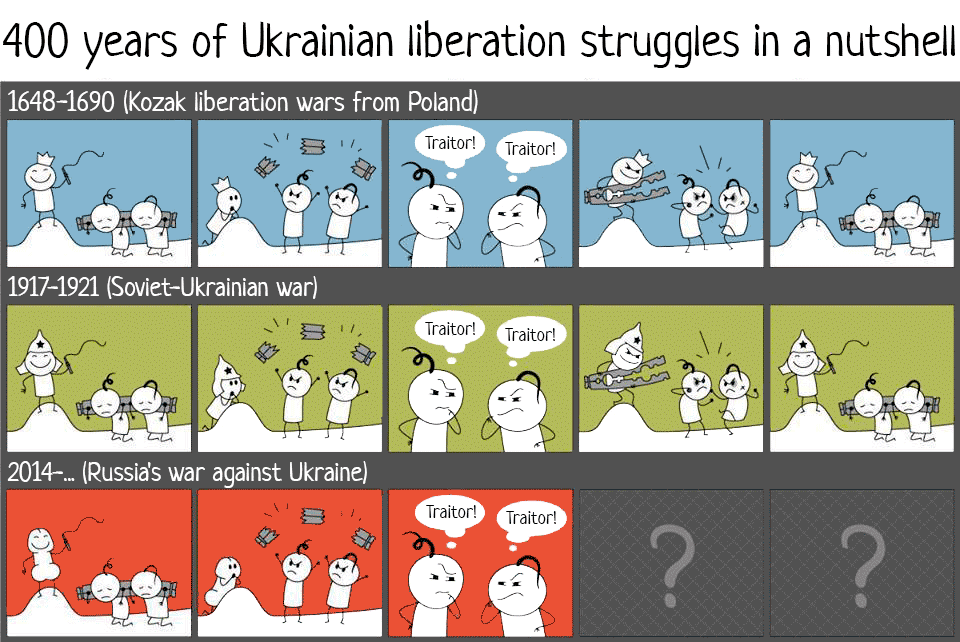
The Euromaidan Revolution and the war in the eastern Ukraine created a huge demand for social and political justice. Civil society formed a clear agenda for a new Ukraine:
- the punishment of Yanukovych regime’s figures personifying the whole treasonous comprador elite;
- an adequate response to the Russian invasion;
- combating corruption.
But the elites went the way of pseudo-reforms. Сonstitutive transformations were substituted by the process of establishing new anti-corruption institutions.
Moreover, the new government did not satisfy the public demand for political justice, namely, to delegitimize the remnants of the Yanukovych regime. Apart from the complicity in Yanukovych’s crimes in corruption and the Euromaidan massacre, his allies collaborated with the Russian invaders, and still deny the very fact of aggression. The new Ukrainian government had the possibility to unite the nation by fulfilling the Euromaidan’s immediate demands, even while remaining hooked up to black cash flows and corruption schemes of the previous regime. But this wasnt’ done.
Instead of being prosecuted, the so-called regionnaires (former operatives of the Yanukovych’s Party of Regions, now mostly grouped in the Opposition Bloc party) were allowed to become full-fledged political actors after the revolution. This should raise suspicions, considering the extent they are influenced by Kremlin. They became a suspiciously comfortable opposition to the Poroshenko administration. The regionnaires remain a powerful factor of absurdity and, most of all, an irritating motivator for anti-institutional, spontaneously-violent patriotic protests.
Rebuffing Russian hybression is an issue where the government ignored public demands the most. This is less about a military response to Russia’s invasion (Ukraine was obviously not ready for that) than about the political and legal reaction of the state to the annexation of the Crimea and Russian-led separatist takeover of the Donbas. Instead of an adequate assessment of reality and proper international legal action, the government responded to the Russian invasion with the plan of a “peaceful settlement” of the conflict with so-called separatists, thus accepting the qualification of the war as an internal conflict, an anti-terrorist operation. The absurd Minsk agreements became the quintessence of the inconsistent and contradictory “Poroshenko Peace Plan,” which was actually imposed by the enemy.
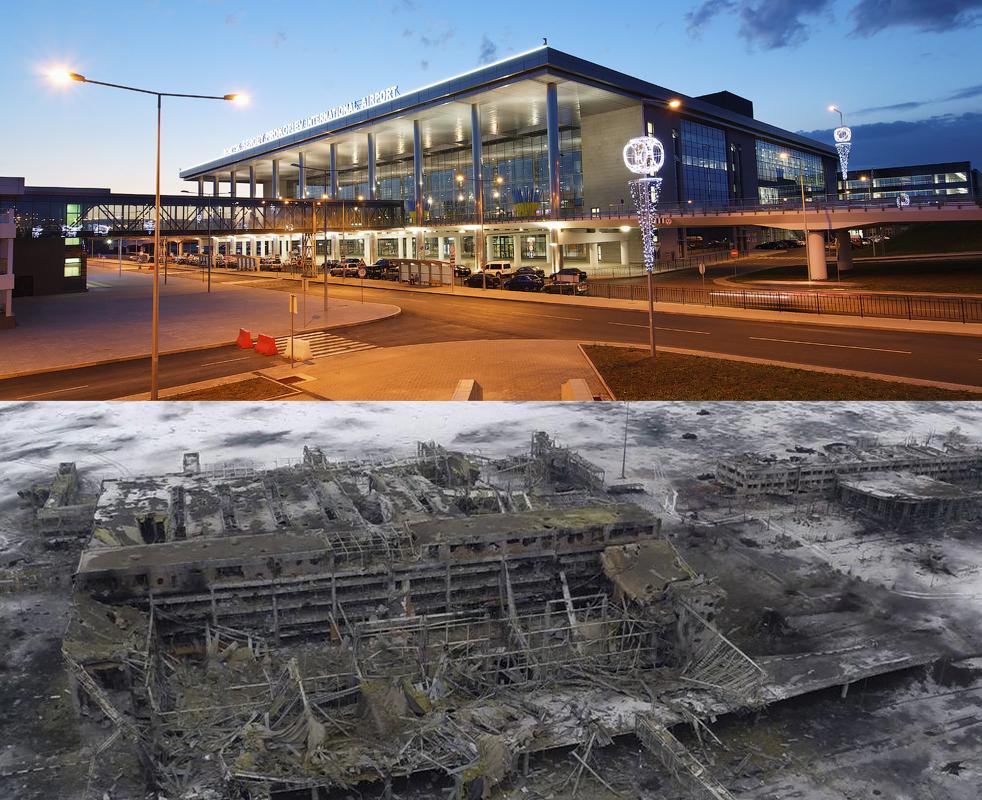
Moreover, Putin’s Ukrainian crony Viktor Medvedchuk is one of Ukraine’s semi-official negotiators in the Minsk talks. The Ukrainian army, Prosecutor’s Office, courts, the whole economy have all been deprived of the legal instruments necessary in a state of war.
By formally recognizing a virtual aggressor, the ORDLO (“certain areas of the Donetsk and Luhansk Oblasts,” a euphemism for “Donbas separatists” used in the Minsk Agreements) besides the real one, Russia, the Ukrainian government failed to admit the fact of an international war.
Viktor Medvedchuk (left) as one of Ukraine’s representatives at negotiations of the Trilateral Contact Group sitting next to ex-president Leonid Kuchma (standing in the middle), another Ukraine representative at Minsk talks. Minsk, 2014
Poroshenko’s chief election promise of an easy and fast peace became a dangerous political trap for his administration. Because of this, the passionary segment of the population opting for an active total resistance to the enemy became frustrated in the government’s perceived inability to protect Ukraine from the Russian threat. At the same time, the common person, now convinced in the possibility of an “easy peace,” he threat of war too lightly. Many Ukrainians increasingly tend to believe that the war is a kind of abstraction, a horror story, or is explained by a conspiracy of oligarchs seeking profits.
This government-nurtured carelessness about the war is the reason behind the wide criticism of an absolutely necessary decision of Ukraine’s ban on the Russia-based social media and email services (vk.com, ok.ru, mail.ru etc). As there was no perceived real threat from the war, the infringement of Ukrainians’ telecomunications rights was seen as impossibly harsh. After all, such thinking is logical in the “Anti-terrorist operation-Minsk deal” matrix, where the majority of Ukrainians lead an ordinary peaceful life, and someone has already decided to pursue a political compromise with the Kremlin.
The Kremlin’s media network within Ukraine: a collective “Russia Today” on the shoulders of revanchists
The government’s tolerance to the Yanukovych regime figures has legitimized their media influence in the post-Euromaidan Ukraine. They include not only Yanukovych-associated MPs or businessmen who switched sides and are now publicly loyal to Ukraine statehood: Serhiy Lyovochkin, Yevheny Murayev, Rinat Akhmetov, Andriy Derkach. The masterminds of the whole corruption mechanism of the Yanukovych regime, oligarchs Serhiy Kurchenko and Oleksandr Klymenko, have been living and doing business in Russia since the war began, remaining under 24/7 surveillance of the Russian FSB.
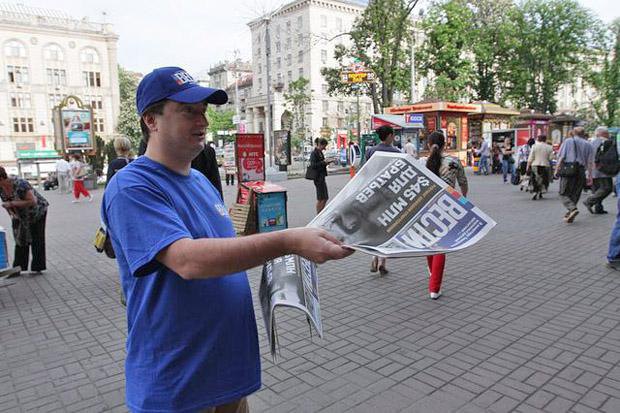
The independent MP Yevhen Murayev, an open revanchist and ex-regionnaire, is developing his own NewsOne TV news channel. Ihor Guzhva, the former editor-in-chief of the Vesti newspaper, is managing the popular Strana.ua news website. Another news channel, ZIK TV, has soared to the national level amid the war-caused economic downturn. Upon moving to Kyiv, ZIK TV is being flooded with editors and anchors from 112 Channel allegedly controlled by Vitaliy Zakharchenko, the notorious Ukraine police chief during the Euromaidan who has fled to Russia and voices extreme anti-Ukraine views and NewsOne TV as well as from Radio Vesti.
At first glance, all the revanchist medias observe a pluralism of political opinions while working to whitewash the Yanukovych regime and discredit the Euromaidan revolution. These media usually refrain from Ukrainophobia and obvious fake-making, unlike how it’s done in Russia.
But a single manipulation strategy can be clearly identified in the editorial approach of all the media controlled by the revanchists: to incite absurdity, to provoke chaos and uncertainty among the audience. This strategy is accomplished by performing several semantic tasks.
Firstly, logical boundaries of discussion and the news context are being artificially and manipulatively expanded to the extent of absurdity. To the point where a lay viewer loses any rational reference points and opinion leaders. The main theme for such “an absurd therapy” is the issue of Russian aggression. All the aforementioned TV channels regularly report on the Donbas war developments, as well as on the Russia’s subversion activities elsewhere in Ukraine, citing the military spokespersons, Ukraine’s Security Service etc. Alongside that, however, there are “politicians” and “pundits” daily appearing on the air to de facto deny the Russian invasion, or point out that Ukraine is the one to blame for the war. The “journalists” in question, however, are not even trying to point out this evident contradiction to either the audience or to such interviewees (not to mention to stop seeking their comments further). The audience is being deliberately immersed in an interpretation absurdity.
For example, former Russia MP Ilya Ponomaryov once told ZIK TV that the 2014 Putin’s invasion was in fact caused by Ukraine Parliament’s attempt to abolish the 2010 language law, granting privileged status to the Russian language [Editor’s note: Ponomaryov actually said that the abolishment of the said law helped Putin start the war, but did not cause it]. Politician Inna Bogoslovska, on NewsOne TV, expressed the idea that “Russians and Ukrainians have been made enemies.” On the same TV channel, anchor Yevhen Chervonenko declares, “In the times of war we must look for things that unite, rather not split apart.
There, “alternative points of view” were gradually weaved in the coverage of national and international topics. These include the opinions such as that man-made climate change, or that the Holocaust of Jews are hoaxes; the European Union oppresses and exploits the poorer EU countries; the Georgia’s Rose and the Ukraine’s Orange revolutions were merely coups organized by the CIA.
Secondly, the revanchist media network demonstrably manipulates issues and figures of current affairs. Topics which are insignificant in terms of factual reality and sociological data are unduly over-covered, and vice versa. Most often, corruption is portrayed as being more important than the ongoing Russian aggression. Marginal politicians and commentators with biographies and achievements offering no grounds for journalistic interest are being promoted way more than they deserve. Completely discredited figures of Yanukovych regime are now being imposed on the audience as moral authorities and experts in all matters along with other pseudo figures. An absurd augmented reality is being created in the minds of viewers and listeners.
The most striking case of the news characters’ manipulation is independent MP Vadym Rabynovych. He hasn’t held any government office, can’t competently comment on any specific policy question. Despite that, ever since the Russia’s invasion began, Rabynovych has been hyped up precisely by the media controlled by revanchists and ex-Yanukovych figures who escaped to Russia. Over the past three years, this media pool has turned him into a recognizable persona, a viable presidential candidate, according to the recent polls.
Thirdly, the media outlets in question systematically exaggerate the size and significance of Ukraine’s domestic problems. Even worse, they tend to downplay the consequences of Russian aggression, as well as Russia’s influence in Ukraine since the country’s independence in 1991. While revanchist lapdog MPs keep denying the Kremlin’s responsibility for the war, their media outlets artificially conceal the problem of Russian aggression in the flow of other news, pushing trash information to the forefront.
A typical example is the side issue of the formal existence of the parliament coalition, one of the criteria for President’s discretionary decision to dismiss the Parliament. The revanchist media portray this geeky topic, with all the details of inter-party compromises, as a major public issue.
Fourthly, the revanchist media network artificially overblows topics that deepen public disagreements and radicalize views. For example, in mid-May 2017, several pro-Kremlin mass-media inexplicably brought up the LGBT “Equality March,” which was set to take place in the last decade of June. Moreover, it affects very few Ukrainians: the number of participants of the gay parades and their active opponents never exceeded several thousand nationwide.
Fifthly, from time to time, the revanchist media pool does resort to primitive broadcasting of the Kremlin propaganda. For instance, Nadiya Savchenko, the independent MP who is also a resident pundit for NewsOne TV, regularly repeats talking points of Russian President Putin and Foreign Minister Lavrov like “we’re doomed to live in one country (with the Russian pseudo-separatists) anyway, so we need to hear them out.” A recent Mikheil Saakashvili talk show on ZIK featured a “street survey” where all the respondents happened to confirm the anchor’s point: the war with Russia continues because the Ukrainian government benefits from it.
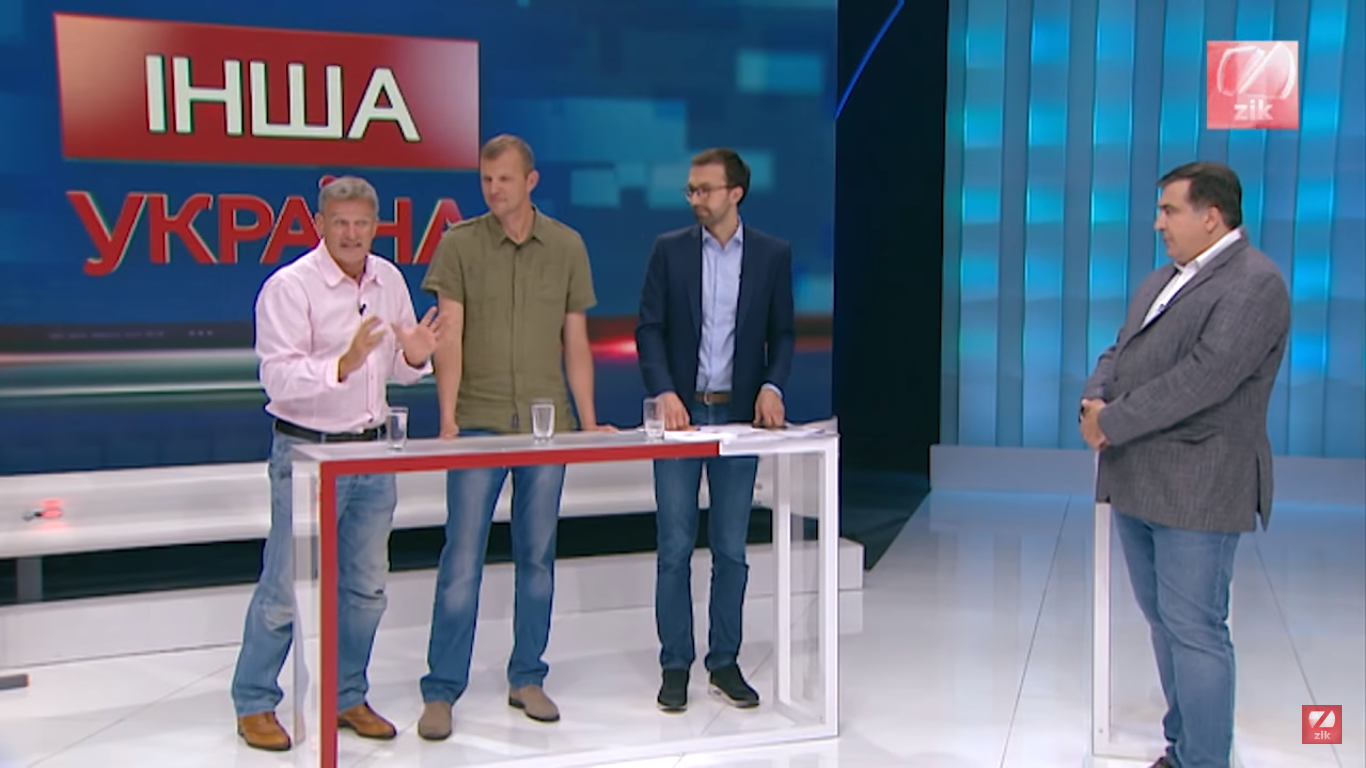
Thus, the audience is being purposefully brainwashed with impressions of the hopeless absurdity of the situation, eternal institutional incompetence of the Ukrainian statehood, lack of hope and perspective.
The main TV channels of the informal pro-Kremlin network, 112 and NewsOne, offered the market a revolutionary (and very costly) news broadcasting format with a non-stop participation of outside commentators: politicians, activists, and pundits. Many such guests admit that these media are controlled by the enemies of Ukraine, but nevertheless justify their own appearances there by the opportunity “to provide viewers with an alternative point of view.”
But the course and the scope of the discussion are not determined by studio guests. This broadcasting format is merely used to impose the false balance of thoughts and legitimize the above described semantic manipulations with the outside studio guests, who are only “ballast” for editors constructing the required thematic and emotional context. The discordant noise, created by the mix of well-known, completely unknown, and sometimes outlandish commentators reinforces the atmosphere of chaos and absurdity. Unprepared viewers struggle with coming to their final opinion on any given issue. Minds are left in despair after this “discussion,” which is the intended effect.
This is how the media controlled by former “heavyweights” of the Yanukovych regime create the atmosphere of chaos, despair, and apathy in Ukraine. This atmosphere is likely to undermine the public support of the ruling coalition and finally delegitimize Poroshenko’s presidency. Most importantly, this might significantly complicate the defensive war against Russia.
The Horsemen of Chaos
The Revolution of Dignity and the war have shown an incredible ability of Ukrainians to unite and self-organize. To achieve chaos in Ukraine, the Kremlin now pushes for infighting among not only politicians and oligarchs but also the leaders of our civil society. Some of them can be reasonably suspected of collaboration with the aggressor. Most infighters, however, are useful idiots. By this term, Soviet diplomats and spies denoted Western activists, used without their knowledge by the USSR during the Cold War.
Anti-corruption activists
Western donors have traditionally supported Ukraine NGO projects aimed at promoting the so-called participatory democracy. They were meant to tackle institutional weakness and corruption “from the outside” through the maximum involvement of media and civil society. First of all, these are journalists and activists specializing in anti-corruption activities. This created a whole new cluster of Ukraine’s counter-elite, consisting of grant-funded figures. They became public opinion leaders already during the Yanukovych rule and played an invaluable role before and during the Euromaidan revolution. Their total domination of the public debate would still be reasonable if it wasn’t for a completely new reality: Russia’s aggressive war on Ukraine.
As stated above, the new government failed to satisfy the people’s demand for reform – provoking an unprecedented, aggressive assault by activists demanding the final dismantling of the corrupt system. As of now, however, this initially righteous offensive has already turned into a hellish political war to kill. A war not so much FOR changes, as AGAINST state institutions and the state as a whole.
A pathological example of “anti-corruption” herostratism is provided by MP and former journalist Serhiy Leshchenko. He has come a surprising way from anti-corruption campaigns pointed at highest officials to, recently, denying the very fact of Russian aggression. The war in Donbas, according to Mr. Leshchenko, continues only because the Ukraine government wants to keep stealing on defense contracts. Moreover, he is now actually relaying Kremlin propaganda about a supposed “ban of on the Russian language” by Poroshenko, as well as calling the state policy of de-communization absurd.

Most anti-corruption figures are hard to suspect of ties to Russia. However, most of them are, consciously or not, trying to absolutize “anti-corruption” beyond any rational limits. These public opinion leaders are pushing hard to completely replace the country’s agenda, presenting corruption as the only evil of Ukraine, and combatting it as the only public goal.
Herewith, corruption is a hot topic for all pro-Kremlin media in Ukraine. They do their best to hype the anti-corruption discussion, to amplify its resonance, to emotionally manipulate it. Any fact or half-gossip on corruption get the priority interest of this media pool.
Apathy about Ukraine is being instigated abroad as well. The West, which discovered the new Ukraine of the anti-corruption Euromaidan in the winter of 2014, is now being fed with a biased picture of a hopelessly-corrupted fragile post-Soviet territory. The feeding is being done with the most active participation of Russia agents in the West, such as US Congress Representative Rohrabacher or French MP Thierry Mariani, and the English-language Kremlin media.
The same goes for the freedom of speech, a sensitive issue for both Ukraine and the West. This is now one of the central themes of the Opposition Bloc – a group of corrupt officials who once grabbed power in the Donbas in the 1990s precisely by “pacifying” the local journalists. As for the anti-corruption activists, their current” freedom of speech” rhetoric contributes to advocating for the revanchist media holdings, which happily give them air time to instigate corruption despair in Ukraine.
“Grant-eaters”
Another group of Moscow’s useful idiots in Ukraine are left-liberal recipients of certain Western aid-sponsored NGOs pushing pacifist and cosmopolitan propaganda. They are increasingly opposed to the Ukrainian army and nationalists, de facto associating themselves with the Russian aggressor. Among the agenda pursued is a campaign against so-called hate speech in the media, actually directed against fact-checking, freedom of speech and “for” censorship. In wartime all this could only stimulate chaos and healthy protest against such an assistance to Kremlin, rather than promote liberal values.
Need we remind that the anti-war movement was created by the Soviet KGB during the Cold War – and is now actively used in Russian hybression in the West, where figures with proven Kremlin ties resort to pacifist populism, not only among the left progressives but also the far right. Both wings of “fighters for peace” are widely represented, for example, among the guests of the Russia Today, a Russia state television outlet.
“Poroshenko bots”
Anticorruption euro-liberals are the most powerful, but not the only chaos-generating group in Ukrainian society. The public discourse is also being manipulated by their opponents, proponents of Poroshenko who are sometimes labeled as “Poroshenko bots,” and are particularly active in social media. Intellectuals serving the government employ several toxic political ideas, first of all, the dichotomous meme “betrayal-victory.” This super-cynical communication tactic was designed to calm down the public about the Minsk Peace Process and other failures of the Poroshenko administration by absurdizing any criticism of failures. In the reality of war, however, a deliberate devaluation of the “betrayal” and “victory” moral concepts causes depression and the dual reaction of the majority’s apathy and the minority’s radicalization. At the same time, this very “Poroshenko bot” scene makes attempts to bully the liberal anti-corruption figures for their perceived lack of patriotism.
Another, more primitive and equally-damaging “Poroshenko bot” strategy, is producing myths about the West’s so far non-existent non-military counteroffensive on Russia, the so-called Anaconda Plan of gradually strangling Putin’s regime, or the predicted death of oil and gas economy. The purpose of this manipulation is similar to the “betrayal-victory” meme: to justify Poroshenko’s absurd “peace plan” by creating the illusion that the West will fix everything instead of Ukraine. This leads two chaos-inducing outcomes. On the one hand, contextual manipulations result in the indirect denial of a real military threat from Russia. On the other hand, if the West has everything under control anyway, why wouldn’t Ukraine just call snap parliamentary and presidential elections right now like the opposition demands, in the midst of war?
Ukrainian far-right and neo-Nazis
The oldest group of Russia’s useful idiots are the Ukrainian far-right and neo-Nazis. Their answers to the war in Donbas, the crisis of the liberal West, and capitalism might be sincere, but they are mostly absurd and useful for the Kremlin. Their use of Nazi symbols is incompatible with Ukraine’s defense against the “Russian world,” as the Russian Federation is a Third Reich reincarnation in almost every detail. Communist methods of “direct action,” such as threats of violence and intimidation that Ukrainian far-right groups use every day, are abhorrent to defending the Motherland (or Nation) in the modern world.
A Kremlin-controlled crisis
What we have in Ukraine is a long-running controlled political crisis. It is controlled by Kremlin. It’s an ongoing, outside-spun spinning top of endless accusations and insults that sometimes generates uniquely absurd points. For example, some known public activists actually accused President Poroshenko of assassinating Belarusian-Ukrainian journalist Pavlo Sheremet, a claim unsupported by evidence.
A country chaotized with infighting is an ideal target for external aggression. This applies to Russia’s attack on not just Ukraine.
Kremlin has sought and, in some countries, achieved, a paralysis of elites caused by intensive, endless discussion of false dilemmas, or issues polarizing society. The most important case of this chaotization is the new US president Donald Trump. The Trump Factor is designed to stir domestic instability in America, thus creating anxiety and “vacuum of influence” worldwide. The vacuum, that the Putin Empire hopes to fill in.
Similarly, the Ukraine society is being “helped” to fixate on domestic problems and disregard the true scale of the threat from Kremlin. First of all, this virtually paralyzes Ukraine’s ability to defend itself from a brazen aggressor. The uncivil debate and mutual accusations about, at times, negligible issues, distract the attention of many from the fact that Russia is trying to destroy our statehood at all, to enslave Ukrainians forever. There is another grave threat from the chaotizing of the Ukraine elites: the public can respond to this chaos with weapons and blood.
About authors: Mykhailo BASARAB and Maksym SERDIUK are analysts in Ukraine with Korner Solutions. Both have in political and social studies, as well as in communications, election, crisis, and risk consulting. Mykhailo Basarab is also a regular guest commentator for various Ukraine media.
This article was translated and annotated by Yuliya Shpak and Maksym Serdiuk. The text has been shortened by Euromaidan editors to fit the site’s article format.
Read also:
- Democracies should prepare for the long fight against Russian disinformation warfare: study
- Russia using “organized chaos” to subvert Ukrainian government – analyst
- Putin can’t ‘catch up and surpass West’ — he can only exploit and spread chaos
- Russia using “organized chaos” to subvert Ukrainian government – analyst
- Ukrainian banks, enterprises, media and energy companies under powerful cyber attack, including Chornobyl NPP
- Trump-Putin bromance is far from over, despite Russia’s anti-American rhetoric
- Containment of Putin’s Russia in today’s globalized world won’t be easy or even enough
- How the Kremlin influences the West using Russian criminal groups in Europe
- Spoiling Ukrainian-Polish relations: next phase in Kremlin’s hybrid war
- Weakness not strength behind Putin’s new doctrine for broader information war abroad and at home
- The 75 Russian military units at war in Ukraine
- Russian troll farms behind campaign to topple Ukraine’s government
- Moscow TV revives infamous anti-Semitic forgery ‘Protocols of the Elders of Zion’
- Russia’s forced friendship
- Moscow expanding its cyber war against Ukraine
- The Russian organizers of a “Third Maidan” in Ukraine
- Disinformation across ages: Russia’s old but effective weapon of influence
- Kremlin disinformation campaign extremely successful – EU East Stratcom
- Russia determined to expand influence over former Soviet colonies
- Russian hybrid warfare: what are effects-based network operations and how to counteract them





